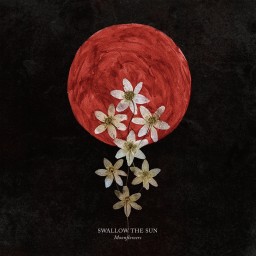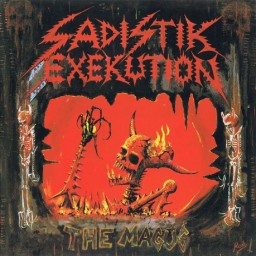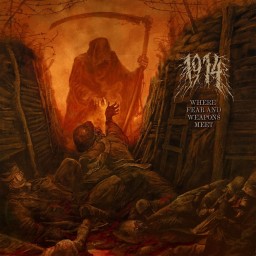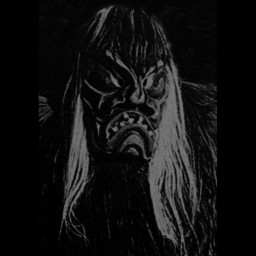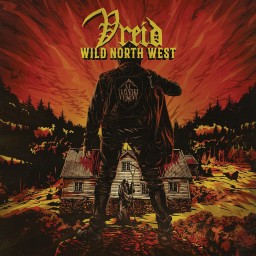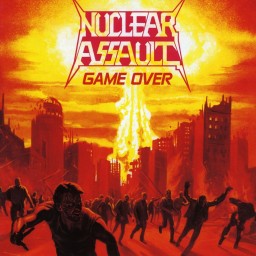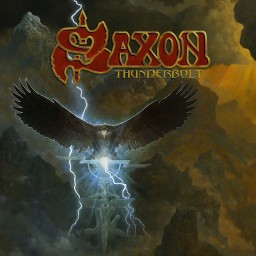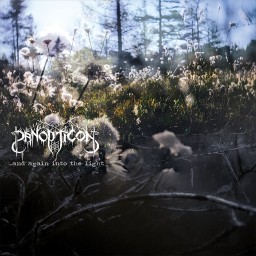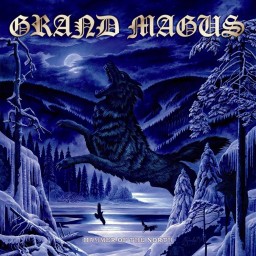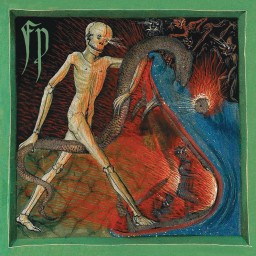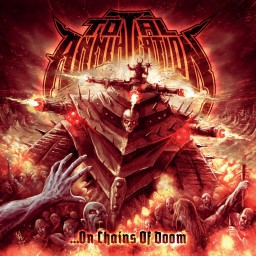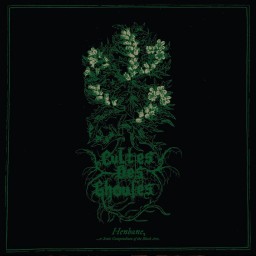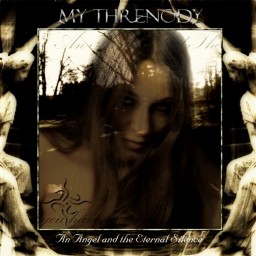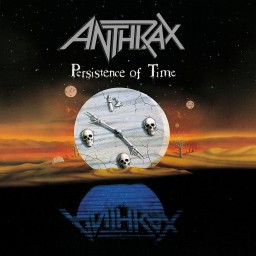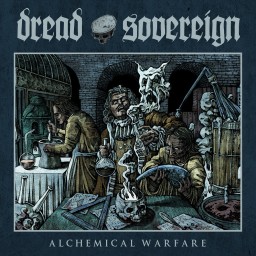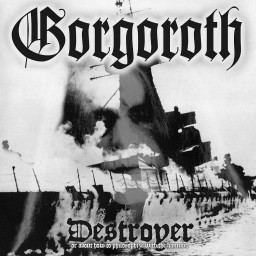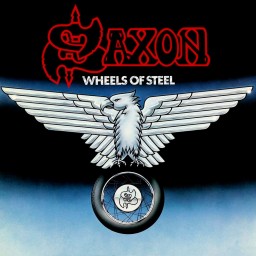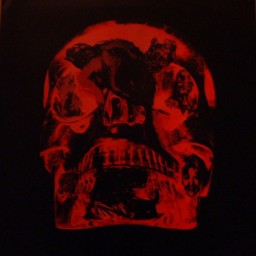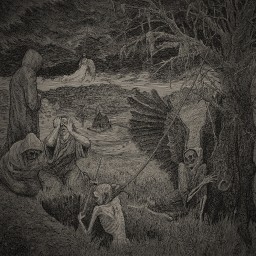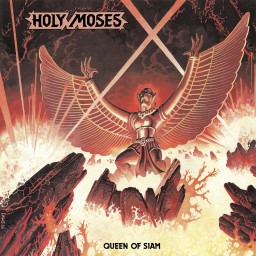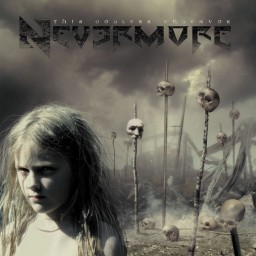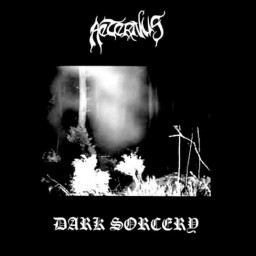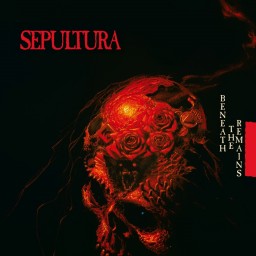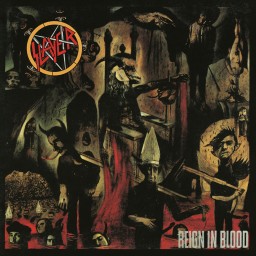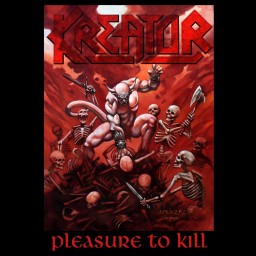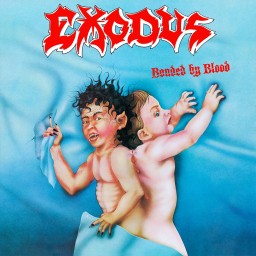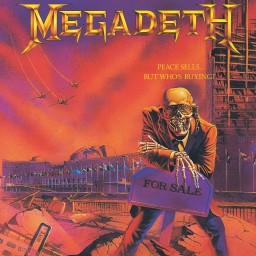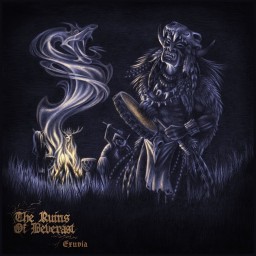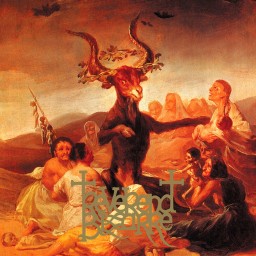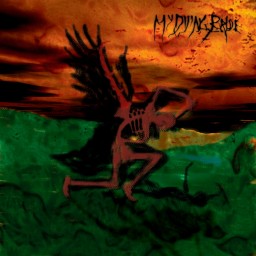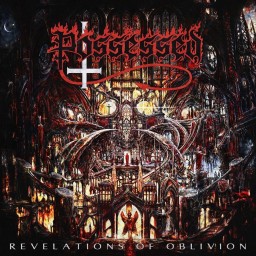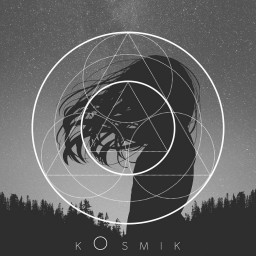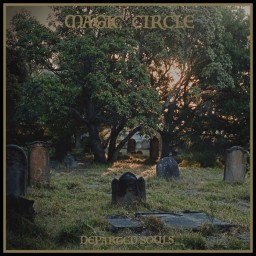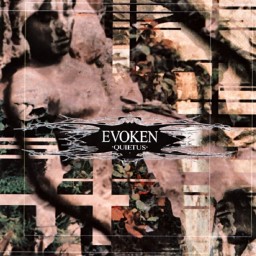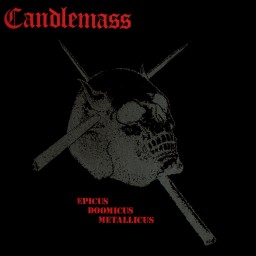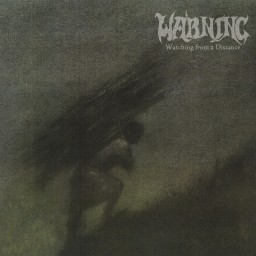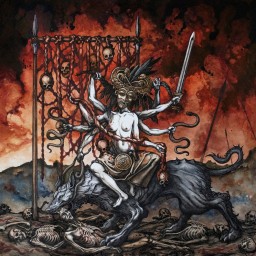Sonny's Reviews
Despite the melancholy beauty of the music on offer on Moonflowers, I found it one difficult album to listen to. Songwriter and lyricist, Juha Raivio, has channelled his grief over the loss to illness of his partner, Trees of Eternity's Aleah Stanbridge, into the release and it is a heartbreaking journey through mourning and grief that is genuinely affecting to anyone who has ever suffered the loss of a loved one. A lot of the album is filled with an overwhelming atmosphere of sorrow and desolation of the soul, expressed through quite simple melancholic melodies, clean vocals and ever-present strings with some extremely soulful lyrics that can really cut to the heart in places. Then sparingly, but all the more effectively for it, anguish is unleashed with huge death doom chords and growled vocals, becoming even more desperate and angry by the album's closing track, This House Has No Home, which erupts into black metal-led pummelling as Juha's anger and rage finally explode from the speakers in search of catharsis.
Opening track, Moonflowers Bloom in Misery, starts in gently mournful fashion, softly picked guitar notes, swelling strings and melodic clean vocals poignantly asking "can you die of a broken soul?" before exploding in anger with huge, enveloping death doom chords and savage growls replying "You cry through the fires of Misery! Bleed dry through the nights of Misery!" as if the pain of loss has just become too much to bear and anger at the injustice of it is all that remains. This, in common with much of the album, is more melodic than most of the band's usual output, but don't let that fool you, this is still powerful stuff and when it does explode it hits like a slap in the face! In a reversal of Moonflowers Bloom in Misery, the following track, Enemy, hits hard with anger and rage from the off and throughout the verse as Juha's lyrics tell of how he withdrew from the light into the darkness inside his soul, becoming softer and more melodic, returning to clean sung lyrics for the chorus as he recognises this darkness within himself.
Woven Into Sorrow is the most gothic-sounding of the album's eight tracks and, arguably, the most accessible as it eschews any death metal vocals and has only brief heavy riffing, at least up until the five minute mark when it unleashes a real gut-punch of a riff as once more Juha's lyrics are no longer able to contain the pain he feels. This is followed by my favourite track, Keep Your Heart Safe From Me, which I perceive as a genuine masterpiece of gothic death doom, expressing in music and lyrics everything that exemplifies the genre in a track that only a few of the masters of the genre can match with it's expression of misery and despair. Oceans of Slumber's Cammie Gilbert supplies female vocals on All Hallows' Grieve, as the lost love speaks to the bereft narrator in a duet that is as heart-rending as it is melodic. I will dispense with the track-by-track review, but suffice to say, the latter half of Moonflowers retains the ability to move the listener every bit as much as the first half, culminating in the aforementioned visceral savagery contained within closing track This House Has No Home as Juha's suffering becomes insurmountable and threatens to overwhelm him.
I think there is an authenticity contained within Moonflowers, as a result of Juha's personal loss, that gives it an edge over many other gothic death doom albums' expressions of mourning and sorrow, which are borne of the songwriter's imaginations rather than personal experience of genuine sorrow. Another important contributing aspect I haven't really covered much is the addition of the string accompaniment from the three ladies of Trio NOX which is present throughout the album and is considered so fundamental to the album's success that the deluxe versions contains an extra disc which contains the string versions of each of the album's tracks to be enjoyed in isolation. The strings add an extra layer of lushness to the sound and contribute to the sorrowful atmosphere in that way that strings do so well when accompanying certain types of doom metal.
This is, for me, one of the best gothic death doom albums I have heard in a long while and is deeply affecting on a personal level, as well as providing some top-quality songwriting and performance and this personal connection is something that is very hard to achieve but is deeply rewarding when it is successful and, as such, I consider this very successful indeed.
Genres: Doom Metal Gothic Metal
Format: Album
Year: 2021
This is the debut album from Aussie death-thrashers, Sadistik Exekution and although it was recorded in 1988 various issues plagued it's release and so it didn't actually see light of day until 1991. This is a great example of 1980's extreme metal, exhibiting raw aggression and an irrepressible enthusiasm and combining it with decent technical ability for some pretty brutal stuff considering it's year of recording. The production of course is for shit, but that only adds to the charm for me, increasing the underground appeal and ensuring it's adherents remain poseur-free! Anyway, if you can get past the production issues (and I've certainly heard plenty worse) then there is much to appreciate here and a big plus from the production is that it allows Dave Slave's terrific bass playing to rise to the surface and get the notice it deserves, as well as, intentionally or not, lending the whole thing a kind of war metal vibe. It also seems like there is a quite noticable difference in the recording quality of some of the tracks, suggesting at least a couple of different sessions were involved in getting the album down on tape.
In founder and singer Rok I think I have discovered one of my favourite extreme metal vocalists. His savage growl is pitched just perfectly, somewhere between death metal growl and black metal shriek, and sounds fittingly menacing and evil and suits this material astonishingly well. The guitar riffs are another casualty of the piss-poor production, but the Kerry King-ish solos still cut through the mire like a sabre slash. The song-writing is pretty varied, the rules for extreme metal not being written in stone at this point and technically, underneath the murkiness of the production, they seem like a pretty proficient bunch with hints at early tech-death techniques, even employing some synth work for added atmosphere especially during the closing couple of tracks, the weirdly disturbing John Carpenter horror movie soundtrack-like ambient track Spirits Are Komming and the doomy I'll Kill Ya, You Bastard.
I may well be getting a bit carried away with this one and leaving myself open to accusations of being a tr00 kvlt, elitist arsehole, but if you are looking for some early technical deaththrash with proto-war metal leanings and some synthy weirdness - and who isn't - then I would heartily and unreservedly recommend this unto you (and you can call me what you want - I don't really give a shit!)
Genres: Death Metal Thrash Metal
Format: Album
Year: 1991
I have always been a bit of a WWI buff and consequently I was drawn to 1914 by their 2018 album, The Blind Leading the Blind. Their blackened death metal assault has been heavily beefed up by a production job that makes for an all-enveloping wall of sound and an auditorial overload that adds to the band's overarching theme of The Great War's debilitating and dehumanising effect on the men forced to participate in it's seemingly endless slaughter. The muscular riffs are heavy as fuck (check out the awesome death doom riff on The Green Fields of France) and the rhythm section do a great job of remorselessly driving the tracks along. Dmytro Kumar's vocals are powerful, lying somewhere between a death metal growl and a black metal shriek and the lyrics he enunciates are even more powerful still. From Vimy Ridge (In Memory of Filip Konowal) and Pillars of Fire (The Battle of Messines) with their common soldier's tales of slaughter that take no pride in victory only relief that it was they who lived and the enemy who died, through the balladic Coward (with vocals from Ukrainian folk singer Sasha Boole) and it's depiction of blind panic and summary justice for it's victim, to the poignant letter to the parent's of a lost artilleryman recited in ...And a Cross Now Marks His Place, these are lyrics that seem to authentically depict an horrendous period in human history and provide them with the gravitas they deserve. This is no stereotypical black metal glorification of war, but a sincere indictment of it.
The aforementioned ...And a Cross Now Marks His Place also features Paradise Lost's Nick Holmes who provides a few short but extremely effective vocal lines in what is an absolute beauty of a track and with it's accompanying video it may well be the song that propels 1914 to greater renown. This is as effective an anti-war song as I have ever heard. Anyway, I've had this album on almost constant rotation since the first listen and I've listened to other stuff, sure, but I keep coming back to this, so that must say something.
Genres: Black Metal Death Metal
Format: Album
Year: 2021
For anyone who is interested, Paysage d'Hiver's second official album continues the story of The Wanderer, who this time around meets beings from another dimension who he sees as ghosts. The kicker is that the extra-dimensional beings are us in our world and we are only able to contact The Wanderer through the Rites of Winter such as those practiced by a traditional mask cult from the Lötschental valley in Switzerland which, presumably, Wintherr is familiar with. One such mask is depicted on the album's cover and is indeed a fearsome-looking item. (I swear you learn all kinds of weird shit when you listen to black metal!)
This time around Wintherr has trimmed the length of the tracks, the longest, excepting the ambient closer, is under seven minutes, which is unheard of with this project. The style is much nearer to conventional black metal than the icily frigid soundscapes Wintherr usually conjures up. I would even go as far to suggest that at times it doesn't sound hugely dissimilar to early Darkthrone. I have a feeling this may upset some of the newly acquired fans that Im Wald garnered the project, but somehow I get the feeling that will bother Wintherr not one jot.
Despite the abbreviated track lengths this is still quite a formidable album, it's eleven tracks clock in at 70 minutes - a snip compared to Im Wald's two hours I'll grant but still a daunting duration for some not used to lengthy black metal excursions. Again, despite the shorter tracks, the album doesn't offer a massive amount of variety and heavily relies on repetition for it's effect so, once more, if you're not familiar with the style it may underwhelm and disappoint. For those of us more used to this style of black metal though, there is plenty to get your teeth into. The vocals are Wintherr's usual washed out shrieks that tear through the ether like a banshee wail and would freeze the blood were you to hear them during a nighttime forest hike! As mentioned previously the tracks really only serve as parts of a whole and it is the cumulative effect of the tracks' repetition and their more visceral savagery that is the album's real aim I would venture.
Overall, Geister is a brave move by Wintherr, released on the back of such a critically acclaimed album as Im Wald and yet deliberately moving away from what made that album so successful. While I must admit it doesn't scream "Masterpiece" in the same way as Im Wald, this is still a great black metal album and the day that a black metal artist like Wintherr starts doing what he feels is expected of hm then that is the day that black metal is truly lost. Luckily that day still seems a long way off.
Genres: Black Metal
Format: Album
Year: 2021
Surprisingly I am not particularly familiar with Vreid considering that they were formed from the ashes of Windir (a band that I had a lot of time for) after the death of mainman Valfar. Consequently their ninth album is the first I have spent any time with. Apparently the album has an overriding concept which is based on tales and legends of their homeland in the north of Norway, hence the title Wild North West.
I must admit that the album caught me off guard a bit, there is a lot more variety to the tracks than I was expecting. Although the band's focus is primarily melodic black metal, that is mitigated by a number of other influences such as traditional metal, thrash metal and even gothic rock. Whilst this variety is welcome, it does affect the flow of the album and makes it feel a little bit fragmented. Dazed and Reduced, for example, sounds like it may have come from a completely different band with it's clean vocals and heavy gothic rock leanings and Spikes of God is a track seemingly of two differing halves. Shadows of Aurora seems to borrow a riff from Among the Living era Anthrax (think Skeletons in the Closet) and Into the Mountains has a layered chorus that, for me, doesn't work and to make matters worse has an electronic section that sticks out like a sore thumb. Back to back, these four tracks provide a strange and inconsistent heart to the album that I can't completely get behind.
The opening two tracks (the title track and Wolves at Sea) and the nine minute closer Shadowland (even with it's nice lone piano outro) are far more conventionally melodic black metal in nature and are, for me personally, the best tracks on the album (although I do like the thrashiness of Shadows of Aurora). Overall, an ambitious but fatally flawed attempt at a black metal concept album that just missed the mark a little too much for my preference.
Genres: Black Metal
Format: Album
Year: 2021
I have only had a limited exposure to Nuclear Assault over the years. I did see them support Slayer on the South of Heaven tour in the UK and the main thing I remember about their performance was them taking the piss out of hardcore for about five minutes by making lengthy introductions to songs that only lasted ten seconds or so. Their Handle With Care was also one of the first of those new-fangled CD things that I bought in the early nineties and was one of those albums that was kinda OK, but didn't exactly blow me away.
Game Over was the NY thrashers debut released in 1986 and is a more immediate and vital release than Handle With Care. It obviously has a hardcore/crossover influence with quite short track lengths in the main and an urgent, punkish delivery that conjures up images of frantically flailing bodies hurling themselves into seething mosh pits. Consequently the tracks tend to blur together and the album does have a breakneck runaway train quality to it and I don't say that as a criticism. They occasionaly thrust their tongues firmly into their cheeks as presumably a track like Hang the Pope is not to be taken too seriously, or at worst was designed merely to bait the PMRC (no bad thing that).
The guitar tone is not the best, it's a bit harsh and, in all honesty is a bit hard on the ears. Conversely Dan Lilker's bass manages to underpin the tracks and the ex-Anthrax bass man provides a solid foundation upon which the rest of the band can wreak their nuclear-fuelled destruction.
I must admit I enjoyed this much more than Handle With Care, despite the mediocre production job and it's energetic thrashing is just the thing if you want to work out some aggression. The band's fascination with nuclear annihilation is in full flow on Game Over and the album's best tracks are those Mutually Assured Destruction-themed tracks - Nuclear War being my personal favourite, but Radiation Sickness and After the Holocaust are both very good tracks. Ultimately a pretty good debut that I enjoyed for it's unapologetic aggression from a band that are really only seen as peripheral in the thrash metal history books.
Genres: Thrash Metal
Format: Album
Year: 1986
This is the first Saxon album I've listened to released after 1984 and I went into it with low expectations, expecting nothing more than a rehash of old ideas and a band into it's fifth decade of existence going through the motions because they don't know what else to do. Man, was I wrong because Thunderbolt actually kicks ass as seriously as anything the Yorkshiremen have ever put out. The band haven't stood still in the intervening years since last I encountered them, their sound has evolved in a more power metal-inspired direction and it really suits them. Their knack for writing anthemic songs has been reinforced with steel-edged metal for a heavier and, dare I say, more energetic sound. Sure, they still sound like the old Saxon at times - They Played Rock and Roll is reminiscent in many ways of The Bands Played On, but this is a more "metal-sounding" Saxon to be sure.
Talking of They Played Rock and Roll, I've got to confess to becoming a little bit emotional on hearing it the first time. As I've said before I was a HUGE Motörhead fan and I fondly remember the 1979 Bomber tour with Saxon supporting Lemmy, Eddie and Philthy. I attended that gig at our local venue with a number of fellow metalhead mates, a couple of who are now gone. We all had a fantastic night and the track kind of bought back memories of long-gone simpler times when all we had to worry about was how to get the money for gigs, booze and weed and fuck everything else.
I think the most surprising thing about Thunderbolt is how great Biff Byford's voice still sounds. The guy is seventy years old now and here he sounds better than he ever has. Studio jiggerypokery can only cover so many cracks, so the guy as obviously still got the pipes to deliver an impressive performance. Musically, Paul Quinn and second guitarist Doug Scarratt deliver some amazing riffs and the greatest adrenaline-fuelled solos Saxon have ever delivered are fired off with deadly precision. The production job is superb, with crystal clarity that certainly does the album no harm at all and brings out the best in all the band members.
Tracks such as Thunderbolt, A Wizard's Tale, They Played Rock and Roll and my new favourite Saxon track The Secret of Flight are as good as anything I have heard from the band previously and this is seriously challenging Wheels of Steel as my favourite Saxon album. Respect to such a veteran outfit for not resting on their laurels and still being able to go toe to toe with the younger bucks and not be left wanting. Colour me impressed!
Genres: Heavy Metal
Format: Album
Year: 2018
For the last decade, since the release of Kentucky in 2012, Austin Lunn, in his guise as one-man project Panopticon, has been one of, if not THE most consistent performer in black metal, with six full-length albums and a number of eps and splits of absolutely stunning quality. He is also the only exponent of note in the niche sub-sub-genre of bluegrass and americana-influenced atmospheric black metal, probably because he is just so damn good at it that, even in these bandwagon-jumping times, nobody dares compete head to head with him for fear of being exposed as massively inferior talents.
His latest full-length, ...and Again Into the Light, has well and truly got it's claws in to me and is easily my most played album of recent weeks. As the man himself points out, this is Panopticon's darkest and heaviest release so far, even withstanding the gorgeous melancholy of the folk-centred passages. Austin explains in an interview on Bandcamp "This album is intensely personal, dealing with many different subjects but all related to loss and trauma" and continues, "The album is full of atonement, apologies, and growth. Like many things in life, the process is ugly, but the hope is to arrive at better versions of ourselves in the end." This accounts for the sadness that permeates the folk sections, but also for the brutality of some of the heavier parts as the ugliness of the process he describes is leant a voice by his powerful riffing and savage vocals (although the latter are somewhat buried in the mix).
The album begins with the gentle sadness of the title track, the violin that is prevalent throughout the album only serving to increase the wistful melancholy of the track's atmosphere as Panopticon ease us unsuspectingly into second track Dead Loons which, after a pensive first three minutes, suddenly transforms into an almost funeral doom-like dirge before really letting loose and exploding into a pummelling, pounding runaway train of a black metal riff and features some of Austin's most flamboyant soloing, although true to the man's humility, it is buried a little in the mix almost so as not to detract too much from the song's effect.
Rope Burn Exit and A Snowless Winter are amazing wall-of-sound epics that blast and heave and threaten to blow you away with sheer aggressive force like some almighty sonic hurricane. Then comes Moth Eaten Soul which is probably Panopticon's single heaviest track to date, drawing on death metal influences to increase the aural savagery that the music visits upon your now battered eardrums. This is an almighty beast of a track that opens up a new direction for the band as he explores a heavier and more brutal side of his musical persona. This savagery is followed by the album's gentlest couple of minutes as we take a short breather with As Golden Laughter Echoes which leads into the album's most heartfelt track, The Embers at Dawn, featuring clean vocals from Erik Moggridge, fresh from his collaboration with Bell Witch, and harsh vocals from Waldgeflüster's Winterherz. The build-up is gorgeous and the release as the wave breaks is almost orgasmic in intensity. The album closer Know Hope is an epic that begins as savagely and aggressively as other tracks here, but eventually resolves itself to embrace the hope of the title and to end the album on a positive note.
This is an album from an artist who is absolutely at the top of his game and who has an uncompromising view of what he wishes to convey in his music, having the confidence to embrace new modes of expression as well as honing his more usual methods to an absolute cutting edge. If I hear a better album released this year then I will consider myself very fortunate indeed.
Genres: Black Metal
Format: Album
Year: 2021
Grand Magus are one of my absolute favourite metal bands (I have physical copies of every one of their albums) and are also one of the world's great underrated trad metal outfits, continuously losing out to the next over-hyped darling that the metal labels or music press want to foist on us. The Swedes' consistency since the turn of the century has been exceptional and their run of albums from 2008's Iron Will, through Hammer of the North to 2012's The Hunt would stack up against any three-album run in my book. They make fantastic, hook-laden and memorable metal tunes that I often find come unbidden into my mind and end up with me singing them along to myself (and thoroughly enjoying it too)! - I, the Jury, Mountains Be My Throne, The Lord of Lies and At Midnight They'll Get Wise are all sing-along classics for me.
GM's downtuned guitar sound often has them associated with doom metal, but they have not really played any doom outside of 2001's self-titled debut, although it does have an influence - particularly from bands like Gates of Slumber. JB Christoffersson's vocals are great - no histrionics, just decent, solid, metal singing with a decent range where, unusually, every single lyric can be heard. None of the trio will probably ever be singled out for their technical skills (although they are all extremely proficient) but GM's strength lies in their ability to craft memorable heavy metal tunes and their tight performances. With these guys there is no showiness, no unnecessary gimmicks, just honest, fist-pumping, horns-in-the-air exhortations to the Elder Gods of Metal. Most of the tracks are medium-paced, but when they do speed things up, such as on I, the Jury and At Midnight They'll Get Wise then they have a real 70's Judas Priest vibe. The lyrics on Hammer of the North are very Scandinavian - tales of mountains, sea-raiders and ravens are staples of scandi-metal and should appeal to any red-blooded metal fan. The production is crisp and allows the songs to shine with a clarity that is to be applauded.
I don't listen to a huge amount of modern trad metal, to be honest, but Grand Magus are one of those bands whose latest album I would buy blind, because I know exactly what to expect and just how damn good it is likely to be. Unfortunately the band are largely ignored by most metal influencers so don't really get the recognition they deserve, but those in the know realise just what a great band they are - one of metal's best kept secrets.
Genres: Heavy Metal
Format: Album
Year: 2010
This seems, upon a first listen, to be quite a complex black metal album with it's strange song structures, their stop/start nature, the chants, the disparate array of percussive elements and the keening guitar soloing, but under all this dissonant chaff there is actually a real old-school beast of an album that harkens back to the likes of early Mayhem and Darkthrone with some killer 90's BM riffs (the one in the middle of Wherein a Messenger of the Devil Appears was a real "gotcha" moment for me). The fact that this crazed, schizoid black metal concept album is the product of a single person (Bestial Devotion, drummer of Gainesville's Negative Plane) is amazing, as it sounds far more like it has the kind of dynamic that can only really come from a full band.
The album is comprised of four tracks, each weighing in at a length of eleven to thirteen minutes, that tell the story of Christian martyr St. Achatius, who was tortured and beheaded in Byzantium during the early 4th century for refusing to recant his faith. The busy nature of the tracks, the lo-fi aesthetic and heavy distortion, does invoke an atmosphere that illustrates the relentless nature of the venerable saint's trials at the hands of his torturers, not allowing a moments respite, similar to the modern tales of unrelenting torment meted out in places like Abu-Graibh. The interspersing of the tracks with occasional chants and (more frequent) bell effects suggests the poor Achatius steadfastly clinging to his faith despite this onslaught against his soul from the more dissonant elements.
At first listen I wasn't exactly over-enamoured by this, as it seemed like it was wantonly disjointed and felt like an attempt at some kind of avant-garde black metal collage, but subsequent listens have allowed me to recognise that underneath it is quite a primal black metal record that hasn't actually strayed all that far from the genre's earliest roots. I've bought in to it's jagged, sharp-edged structure and the disconcerting effect it has on the listener, like a painting or picture that is viewed from a weird perspective. The result of all this is a real one-off of an album that I have heard very little to compare with (this of course may be a failing of my own and perhaps there are loads, but I don't think so). Yet another album that proves black metal is still a long way from having run it's course and can still turn out original releases of exceptional, thought-provoking quality.
Genres: Black Metal
Format: Album
Year: 2019
First off I've got to say the production on this album is first rate - the sound is crystal clear and every instrument can clearly be heard - in particular there are a couple of early moments when the bass shines throught to great effect, at the end of opener Falling Fast and during the chorus of Reborn in Flesh. The guitar sound is crisp and the drums have a great "snap" to them.
The songs themselves are fairly aggressive death/thrash, borrowing heavily from the Kreator template and in this comparison is sowed the seeds of TA's destruction, because compared to the Teutonic giants this will always come off second best. The songwriting is decent, if not earth-shattering, but to be honest it's virtually impossible to sound original playing a fairly limited style of metal like thrash after nearly forty years of the genre's history.
The vocals, whilst being mainly well-suited to the style are just too similar on every track. A slower track like the first half of Dead Souls for example, would really benefit from a different vocal style - Daniel Altwegg's delivery seeming to limit what is the album's standout track. In fact Dead Souls is the track that gives me some hope for the band as technically the members are all exceedingly proficient, but it seems like the songwriting (along with the vocals) are limiting them. However Dead Souls proves that they have it in them to write excellent thrash metal and if they can produce more in this vein then they can yet put out a great album.
As it is, this is good, if somewhat predictable, aggressive thrash metal from a band I feel are capable of more and I seriously hope they manage to take that extra step up.
Genres: Thrash Metal
Format: Album
Year: 2020
The first thing that strikes me about this album is the somewhat unconventional tone of the guitars for a black metal album, sounding more akin to the tone of old-school death metal such as Autopsy, even down to the "looseness" of the playing. Add to this the ritualistic rhythms of the drumming in many places that give the album a genuine occult atmosphere and you do indeed have a unique black metal experience that, despite this, is still very much in the realms of black metal - the vocals in particular are especially tortured and unhinged-sounding (the deranged howls during The Passion of a Sorceress are indeed something to behold). In fact vocalist Urian's performance is possibly one of the most disturbed and disturbing I've heard since Silencer's Death Pierce Me - from demonic growls to piercing shrieks and the afore-mentioned demented howling this sounds like an artist on the edge (of sanity!)
There is a nice variation in pacing of the material, the creeping, crawling of Vintage Black Magic owes as much to doom metal as it does black metal and as such it adds an extra level of heaviness to the song. In fact the album as a whole feels more like a bludgeon than the usual sabre-like slashing and slicing of conventional black metal, even on the faster, more feral-sounding tracks like Festival of Devotion.
Overall this album is a great attempt to do something a little different with black metal that feels like the band have stamped something of their particular personality on the recording that goes beyond mere entertainment and into the realm of genuine self-expression (and presumably some kind of personal catharsis). What's particularly great about it for me as the listener is that I can't for the life of me pick out one particular favourite track - they are all brilliant, each in it's own way.
Genres: Black Metal
Format: Album
Year: 2013
My Threnody are the solo project of Brazilian multi-instrumentalist Jefferson Brito. This, his debut album, was recorded in his home studio and, to be honest, it sounds little better than a demo recording which, for this type of symphonic metal, is really going to adversely affect how successfully it comes across. An anomaly of the production is that the numerous gentler sections actually seem to sound louder than the heavier parts, which detracts from the effectiveness of both. It seems to me that Mr. Brito's songwriting ambitions are considerably greater than his ability to deliver them. He seems to be one of those doom artists who think that the best way to express loss and mourning is to throw the kitchen sink at it, keyboards that are laid on with a trowel, obtrusive sound effects, simulated classical instruments, variations in vocal style and gentle/heavy transitions that feel forced rather than organically flowing one into another. It's almost like the guy has too many ideas and wants to cram as much as possible into his hour's runtime without allowing any to become fully formed. With so many ideas, there are some that actually sound like they may make for a decent song if allowed to develop a little further and it's a shame that they are crowded out. I feel that sometimes these solo projects would be better as a full band where they can bounce ideas off each other and allow for a bit of self-editing. Sometimes less really is more.
Ultimately, I am no big fan of this type of symphonic doom even when it's done well, so this shoddy-sounding morass of competing ideas and underdeveloped songs really doesn't move me like good doom metal should and in a crowded field this has too many superiors to warrant too much attention.
Genres: Doom Metal
Format: Album
Year: 2002
I've recently been extensively revisiting Anthrax's earlier stuff and whilst Spreading The Disease and Among The Living still retain their classic status for me, I have had a huge about-face with the subsequent two albums, State of Euphoria and Persistence of Time. I was originally much better disposed towards State of Euphoria with it's catchier choruses and less so to PoT's denser material. However, I feel time hasn't been too kind to SoE, whereas Persistence of Time has aged much better. Neither are as good as the previous two albums and I feel the main reason for this is the fact that there are less by way of backing vocals (particularly Scott Ian) that helped to beef up Joey Belladonna's performances on those earlier releases. Joey is a perfectly fine singer, but lacks the vocal presence to carry off such aggressive thrash in isolation, sounding a little weak as a result.
SoE comes across as a bit throwaway now and, to be honest, in places a little silly, fuelled I'm sure by the "success" of I'm the Man. PoT, however, whilst not having as many great songs as Among the Living is much more akin to the 1987 classic and songs like Blood and Gridlock wouldn't feel out of place next to tracks like A Skeleton in the Closet and Imitation of Life. There is some filler and I think it peaks with Gridlock - Intro to Reality, H8 Red and One Man Stands failing to match the preceding highs and sounding a bit vanilla. It does go out strong with Discharge, but overall the latter half is ordinary.
It is a more mature-sounding album than State of Euphoria, but just doesn't have enough killer tracks to justify higher ratings. Would have been much better if they had trimmed the length to about 40 minutes and lost some of that Side B filler.
Genres: Thrash Metal
Format: Album
Year: 1990
Dread Sovereign were formed in 2013 and are the brain child of Primordial frontman A.A. Nemtheanga, who plays bass as well as providing vocals, the trio being completed by guitarist Bones and Conan drummer Con Ri (Johnny King). Musically, Dread Sovereign inhabit the borderland where doom metal meets traditional heavy metal that is inhabited by the likes of Cirith Ungol, The Gates of Slumber and Grand Magus. They alternate between doomy, slower material (She Wolves of the Savage Season, Viral Tomb) and uptempo anthemic metal (Nature Is the Devil's Church, Devil's Bane) all wrapped up in occult imagery and lyrics. The songs are strongly constructed and this album contains some of their most memorable material to date - the promo track Nature Is the Devil's Church, for example, is almost impossible for any red-blooded metal fan to get out of their head after hearing it even just once. There are some nicely integrated solos that aren't merely an excuse for Bones to show off, but really add some great atmosphere to the tracks and Nemtheanga's voice is perfectly suited to just this style of metal. The production on AW is also a big step up from the muddier sound of their earlier releases and provides an increased depth that seems to make the tracks more immediate. Disappointingly, the album closes on a cover of Bathory's You Don't Move Me (I Don't Give a Fuck) that is remarkably similar to the cover of Venom's Live Like an Angel, Die Like a Devil that closed the previous album For Doom the Bell Tolls and isn't really necessary.
Genres: Doom Metal Heavy Metal
Format: Album
Year: 2021
Firstly I've got to say, I don't feel that Gorgoroth ever get quite the credit they deserve, possibly with good reason in later years, but there was a time when they were a thrilling and devastating proposition and worthy of mention amongst any of the second wave. This, their fourth album, is the product of a band in transition, each track utilising a different lineup, four different vocalists being used for example - Gaahl providing vocals on the opener, Pest, the singer on the previous album singing on four of the remaining tracks, mainman Infernus on a couple more and Malignant Eternal's T-Reaper on The Devil, The Sinner and His Journey. Despite the variety in each track's performers, it doesn't result in a disjointed release as you may expect, rather it is an album that absolutely has an overarching theme and mood and that is one of blistering chaos and nerve-shredding antagonism that feels like the band were trying to produce the most evil-sounding record released up to that point. It sounds to me as if it was heavily influenced by Mayhem's EP of the previous year, Wolf's Lair Abyss, which was also a release that heralded a change in direction.
This time around Gorgoroth's songwriting utilises passages of sheer noise, occasional slowing of tempo and savage, soul-shredding shrieks for vocals in the most part. Despite the noise elements and the savagery on display, underneath there are actually some quite melodic riffs, but they are well-disguised among the intended cacophony yet they enable the tracks to remain in the memory rather than just becoming a dissonant blur. I actually think Destroyer is a great album in it's ability to make an undoubtedly intentionally chaotic-sounding album memorable and like the band that spawned it, it is mightily underrated and should be lauded amongst Nineties black metal afficianados.
Genres: Black Metal
Format: Album
Year: 1998
First, let me put this album into some kind of context. In 1979 I finally got my first motorcycle, a Suzuki T250 Hustler which, with a top speed in excess of 100mph was a bit of a beast for a 17-year-old kid. Now this new-found freedom just happened to coincide with one of the most exciting things to happen so far (after the acquisition of said motorbike) in the life of that 17-year-old heavy metal fan - the onset of what later became known as the NWOBHM (we didn't call it anything, it was just our lives!) Anyway, I'd regularly hop onto that bike and, with a few mates, take the 15 mile trip to the nearest hall that allowed metal and rock bands to play, to see the bands I was familiar with - Sabbath, Priest, Motorhead, UFO, Whitesnake, Thin Lizzy and the likes. It was around this time that these big(ger) names started being supported by bands not much older than ourselves that were actually pretty exciting, bands like Angel Witch, Girlschool, Marseille, Samson and (to finally get to the point) Saxon. These young bands were generating some real energy and doing an absolutely brilliant job as warm-up acts, pushing the headliners all the way. The problem was that after witnessing them live and in their element, when you got hold of these new band's records they actually seemed a bit flat and sadly disappointing, with a very few exceptions - Angel Witch's debut, the first two Maidens and this underrated gem.
The first Saxon album is, in all honesty, a bit crap and I know the majority of fans prefer Strong Arm of the Law but, along with the other three albums I mentioned, this is the absolute essence of what the NWOBHM meant to me as someone who was there. I mean, how can a budding biker not be taken by the opener, Motorcycle Man and the entire album has a feeling of freedom that really resonated with me at the time and I still have a strong emotional attachment to. Where it scores over the other Saxon albums is that it manages to capture the energy that I remember from when they used to open for Motorhead (they were one of the new bands Lemmy took under his wing) in a way their others didn't.
There's some great riffs on display here (Wheels of Steel is absolutely killer), Biff Byford never sounded better, Pete Gill and Steve Dawson propel the songs like a supercharged V8 and Paul Quinn and Graham Oliver are devastating. There are some genuine classics, the title track, Machine Gun, Motorcycle Man and, of course, one of the first heavy metal singles to get airplay on daytime Radio One in England, the superb 747 (Strangers in the Night) with it's searing intro and oddly affecting tale of a plane about to crash. Seriously, if you're a metal fan and have never heard this album, do yourself a favour and remedy that as soon as possible. Anyway, thanks for indulging an old metalhead and his reminiscences and really, check this out.
Genres: Heavy Metal
Format: Album
Year: 1980
This EP, released as a single-sided 12" of 500 copies on Rise Above was only for sale at the Rise Above Records 20th Anniversary Show on Dec 13th 2008. It's single, eleven-minute instrumental track is a big departure for Electric Wizard as they dip their toes into the waters of ritualistic drone, particularly coming as it does in a fairly conventional period for the band, between Witchcult Today and Black Masses. There is very little variation throughout the entire eleven minutes, it's stand-out features being the heavily ritualistic-sounding drums and the eerily ominous organ. Jus Osborne's guitar is present, but very heavily buried down in the mix, so you have to work a little to hear it.
This certainly won't be to everyone's taste and has divided even die-hard Wizard fans, but I quite like the way you can get lost in the track and, to such end, it's eleven minutes may even be a bit short. It makes sense for the band to release this as a stand-alone EP rather than part of an album, although I think it would have made a great intro to Black Masses. Probably more likely to appeal to metal heads who dig on drone than straight-up stoners, but you never can tell!
Genres: Drone Metal
Format: EP
Year: 2008
I love MSW's releases under his Hell banner and a proportion of this album is in very similar vein. This latest album was written over a period of five years and is a very personal album for him as it deals with his brother RAW's ten-year fight with addiction and the toll it has taken on the wider family. What we have here then is four tracks of visceral emotion in which MSW lays his (and his family's) soul bare.
Opener "O Brother" is instantly recognisable to any fan of Hell, but with a twist as it initially features a female vocal section before MSW himself takes over in his usual anguish-ridden vocal style. This is followed by the short instrumental "Funus" that is a gentle piano and violin piece of only three minutes duration. "Humanity" begins in brooding style with a gently strummed guitar before a heaving riff kicks in with accompanying soaring vocals. The song then dips and soars from introspection to fuming anger, superbly dragging the listener along with it on this emotional rollercoaster. The final, eponymous track is almost twenty minutes in length, although I hesitate to call it epic as that implies a certain bombast and that's not what this is about. The sorrow, helplessness and bitterness felt by the loved ones around and affected by a person dealing with addiction are laid bare for all to hear, from the resignation and sadness of the tracks post-metal first half to the seething resentment of the sludge-drenched latter half.
This is metal that is at once vulnerable and vicious, as MSW illustrates musically a spectrum of emotion from concern and compassion to frustration and resentment and in so doing has released an exceptional album and one I wasn't expecting at all. The already well-respected (by me anyway) MSW has gone up even higher in my estimation after this incredibly powerful release that really speaks from the heart and should resonate with anyone who has had any experience with addiction or the addicted.
The first five star album of 2020 for me.
Genres: Doom Metal
Format: Album
Year: 2020
Holy Moses were formed in Aachen in 1980 and featured soon to be husband and wife Andy and Sabina Classen on guitar and vocals respectively. As such they were one of the very earliest of the teutonic thrash / speed metal acts. Between '80 and '86 they put out quite a few demos before releasing Queen of Siam in May of '86 on the newly formed Aaarrg Records.
Queen of Siam is quite a fun record with it's thrash still retaining some of the NWOBHM stylings that was a feature of the very earliest thrash and speed metal releases. Obviously Sabina's vocals are a focal point with female singers being such a rarity in the male-dominated world of thrash. Her vocals are of harsh nature with a creditable growl and she even comes up with a pretty convincing impression of Lemmy on Roadcrew, a song that is a tribute to Motorhead.
Musically it doesn't do anything flashy, there's not a great number of solos or guitar hero histrionics, the rhythm section is solid enough and there's a variety in song tempo from the slower NWOBHM influenced stuff to the full-on thrashers. They even successfully repurpose one of my all-time favourite riffs, the killer from Bad Brains' Big Takeover, on the track Queen of Siam.
As I said earlier, it is a fun album and it does have a place in the Teutonic Thrash story, but it certainly isn't essential and by the time of it's release the rest of the German scene was of a far more aggressive and energetic nature and had mainly moved on into more extreme territory.
Genres: Heavy Metal Speed Metal
Format: Album
Year: 1986
The black metal equivalent of Enya or an insufferable new age music CD that bored suburbanites play whilst doing fucking Pilates or some such shit. I can't even imagine who it's aimed at because those types wouldn't be able to stand the shrieking and black metal fans should hate everything else about it. I can smell the sandalwood and see the life-energy emitting crystals from here. Is this really where black metal has ultimately ended up. I thought that KFC ad was bad, but this is just ridiculous. I'm glad I listened to it at work, because if it had been in my own time I would have been REALLY mad! The one star is for the cover, by the way.
Genres: Black Metal
Format: Album
Year: 2020
I am always suspicious of bands that are the darlings of the metal press, as Nevermore certainly were at one time. Mags like Kerrang!, Metal Hammer and Terrrorizer always seemed to be the bitches of the record labels and would schmooze whatever crap the labels were pushing at the time. This is why I spend so much of my time mooching in the metal underground listening to obscure shit no one else cares about I suppose. I have no objection to popular bands, I just like to discover them my own way, not have them pushed into my face by some music press hack at the behest of a record label marketing exec. Furthermore I had somehow garnered the impression that Nevermore were some kind of Dream Theater clone (which certainly didn't help endear them to me).
Anyway, encouraged by positive reviews on this very site, I took the plunge and so, This Godless Endeavor is my first experience of the band. While it is undoubtedly true that they are more Dream Theater than Dream Death, luckily they eschew the endless technical wankery I associate with that bunch of insufferable prog metallers. At first listen I wasn't all that impressed I must confess. Having approached the album from the perspective of a member of The Pit, I was expecting a lot more on the thrash front, but the album seems to contain very little true thrash. I would say it's more akin to the thrash-derived power metal of early Iced Earth. So I then came at it from a different perspective, with more of an open mind to the prog elements. Now my current yardstick for progressive metal are albums like Blood Incantation's Hidden History... and Venenum's Trance of Death, both of which exhibit a degree of visceral aggression which contrasts the intellectual progressiveness and gives a more complete experience in my opinion. This Godless Endeavor does exhibit a little of this primal aggression, but it feels stilted and constrained compared to the more cerebral aspects of the album, which are still the main focus. However, even I must agree, it is done very well, there are some quite memorable, well-written songs and the performance is excellent. I can certainly hear why many people are fans, but it doesn't quite hit the intangibles for me. Sure, I'll nod my head in appreciation at a riff, a solo or a vocal melody but at no point did it make make me want to shout "FUCK YEAH!!" and I think the very best metal should do just that.
Genres: Progressive Metal Thrash Metal
Format: Album
Year: 2005
An excellent, early ep from Norway's Aeternus, that isn't just blood and guts black metal, but a more subtle offering. Opener, Black Dust, is the stand-out for me. With it's Black Sabbath-referencing opening and brilliant blend of black, death and even doom, it's a glorious celebration of dark metal. Next up is Victory, with it's faster tempo it is a more typical mid-90's black metal offering. Third track, Raven and Blood, is another monster of a song, with a number of changes of pace as it switches from out-and-out black metal to a more death metal sound. The record then closes with a short folky passage that rounds the ep off nicely. Overall, the song writing is excellent, on a par with such BM legends as Enslaved and Emperor, and the execution is equally terrific, making it one of my favourite nineties black metal ep's and this from a time when there were some bona fide classics coming out, with which it justifiably stands shoulder to shoulder.
Genres: Black Metal
Format: EP
Year: 1995
Metal is the object of much sneering from the elitist arbiters of cultural worth, probably due to it's blue-collar origins and appeal and general lack of liberal bias. In the past it may well have brought some of this dismissive attitude on itself, but since the turn of the millenium there have been a number of metal bands who are not content to merely rehash the same metal tropes and to elevate their work beyond a mere collection of songs, but rather to use their musical songwriting to produce pieces that can be considered as being actual art. Isis are one such band, emerging from the sludge metal scene, they began adding layers of atmosphere and more subltle sonic textures to the sludge-inspired heaviness, until, by the time of Panopticon, the album was more like an aural oil painting, composed of varying shades and textures of sound to make an imaginative and atmospheric whole that transcends the restrictions of the scene that originally spawned them.
At times meditatively calm and gentle, at others febrile and raging, the light and shade of human emotion are laid bare in musical form, this interpreting of the human condition being one of the central tenets of what makes good art. This, in common with the rest of Isis' work (and atmospheric sludge in general) is not really for the casual listener and is one of those albums where you get more out, the more you are prepared to put into appreciating it.
Now I'm not claiming this to be any revelatory work of unparralelled genius, in fact I actually prefer previous album Oceanic, but I think that albums like this can only enhance the reputation of metal music in the wider world outside the genre's diehard adherents and as such should be heralded as taking metal to a new level of cultural significance.
Genres: Sludge Metal Post-Metal
Format: Album
Year: 2004
I have had an on/off relationship with Sepultura. Their Chaos AD album was my very first CD purchase and is an album I am still extremely fond of. However, their Roots and Against albums did little for me and I lost interest in the band. Beneath the Remains was released four years prior to Chaos AD and is a different-sounding record to that 1993 album. Based heavily on the Metallica / Megadeth sound BtR is classic 80's thrash metal with heavy, powerful riffs. A lot of people claim a death metal presence in here as well, but apart from maybe the vocals I'm sorry, I don't hear it. Igor Cavalera is a fantastic metal drummer and here puts in an exemplary performance behind the kit, propelling the songs along as much as Max and Andreas Kisser's riffs. The production was handled by Scott Burns and is excellent, Igor in particular benefitting from his expertise. Max Cavalera's vocals are powerful and are uniquely his own - being one of those singers you recognise immediately wherever you may hear him. The songs are fairly complex and the playing reasonably technical, but they still gallop along at a pace without becoming stacatto or disjointed as can happen with overtly technical metal. The 'A' side's four tracks in particular are exceptionally strong and the 'B' side doesn't quite maintain the momentum completely successfully, but this is just a matter of comparison and it's five tracks are still pretty damn good.
South America long remained a bastion for thrash metal even beyond the point where the rest of the world seemed to have abandoned it. Sepultura and this album in particular, are probably the main reason for that as bands from that part of the world attempted to emulate their local heroes and kept the thrash flame alive in the mountains and river deltas of the south american continent. That as much as anything pays testament to the value of the band and this album in particular.
Genres: Thrash Metal
Format: Album
Year: 1989
When it was released in 1986, Slayer's controversial third album left Tipper Gore and the PMRC, along with other "moral arbiters", frothing with indignation at it's brutal and blasphemous imagery, but most especially because of one song, the opener Angel of Death and it's alleged glorification of Nazi war criminal Josef Mengele. I am of the opinion that this was purely a shock tactic used by the band, in the same way they utilise violent imagery on other songs like Piece by Piece and Postmortem and is no indication of any Nazi sentiments held by any member, as they have on many occasions attested.
Controversy and lyrical content aside this was at the time probably the most shocking and brutal introduction to any record up to that point. Initially the album flashes by in a killing frenzy, from Tom Araya's opening scream, via King and Hanneman's weaponized solos and Dave Lombardo's jet-propelled drumming, right up until the closing thunderstorm a mere 28 minutes later, leaving the unsuspecting listener breathless and stupefied, instantly demanding another listen to confirm that what you just heard was real. In an interview at the time I remember the band saying that during rehearsals the album was weighing in at around 34 minutes, but with the aggression and energy they put into it at the time of recording it ended up at just over 28 minutes! Despite the pace of the songs, the production allows every note to be heard distinctly and a large degree of respect has to go to Rick Rubin and Andy Wallace for such a brilliant job done.
Ultimately, this is one of those rare albums that defined what metal is and is firmly ensconced in the top few albums of most metalheads, or certainly those who were around at the time of it's release. Sure, with the explosion of extreme metal genres there are certainly more brutal and/or intense albums out there, but they don't have Reign in Blood's legendary status for a very good reason - the songs just aren't as fuckin' good. Angel of Death, the duo of Altar of Sacrifice and Jesus Saves and the apocalyptic Raining Blood. These are all-time classics and need no justification! Reign in Blood is an album that still sounds as vital and thrilling as it did over thirty years ago and that is no mean feat, my friends.
Genres: Thrash Metal
Format: Album
Year: 1986
Make no mistake, Kreator's second album Pleasure to Kill, has only one purpose - to Thrash you to within an inch of your life and to this end it's mission is immensely successful. PtK is a vicious and raw assault on the listener with an aggressiveness few thrashers have ever equalled, much like the previous year's Seven Churches, Possessed's proto-death album. In addition to Possessed's classic, the influence of tracks like Death Is Your Saviour and Pleasure to Kill can be heard throughout the early albums of Death, Morbid Angel and the rest of the first wave death outfits.
While I find it hard to look beyond Reign in Blood as the pinnacle of Thrash intensity, this is one of those very few that comes really close (Dark Angel's Darkness Descends being the other) with several songs that certainly wouldn't feel out of place on Slayer's masterpiece. The riffs are neck-breakingly savage, the drumming brutal and the solos are crazed, while Mille and Ventor's shared vocals are both sublimely suited to this more aggressive style of Thrash.
I have seen any number of reviews complaining about the lack of variety on offer, but that isn't really the issue here. As I said at the start of the review, this album's sole intention is to facilitate your attempt to try to break your neck in a headbanging frenzy and if you want a more nuanced and varied album then this was probably never meant for you anyway. A genuine Thrash classic and a headbanging masterclass.
Genres: Thrash Metal
Format: Album
Year: 1986
Exodus' debut, released back in 1985, is their best by quite some way in my book (although I do have a bit of a soft spot for 2004's Tempo of the Damned too). Really pacy and dynamic riffing with some pretty hot solos and sing-a-long choruses put this up on a par with many of thrash's early classics. For some reason Bonded by Blood isn't considered as indispensible as other early thrash classics by everyone however. There are probably a couple of reasons for this, the drums are merely functional and Paul Baloff's crazed vocals aren't to everyone's taste, but the real reason is probably due to hindsight and the fact that Exodus' subsequent output reached neither the level of this debut or of their contemporaries' later releases (Master of Puppets and Peace Sells.. were still in the future back then, remember) and so the band as a whole are not spoken of in the same breath as the likes of Metallica, Megadeth and even Testament, although I think this is a better album than any Chuck Billy's crew put out. Bonded by Blood, Metal Command and Strike of the Beast are chugging classics that stand against anything from the time. But, goddamn... that cover is still fuckin' horrible!
Genres: Thrash Metal
Format: Album
Year: 1985
I used to avoid Boris like the plague, but took the plunge with this album after seeing the constant raving about it - and now it's possibly my favourite drone metal album. Essentially a single 44 minute piece split into five parts, Part One is made up of the usual huge, droning, sustained chords most associated with drone metal before segueing into a very laid back second section (and the albums longest) that begins very post-rock and spacey-sounding then starts building in intensity (and volume!) before, finally, the vocals kick in. Part Three continues the theme and vocals of the end of Part Two, but also features an awesome, ultra-amped guitar solo before ultimately breaking down into the noise and feedback-drenched chaos of Part Four. The short fifth and final part heralds a return to the laid back theme from Part Two, albeit overlaid with residual feedback from Part Four. This is an album that is as much a sensation to be experienced as much as a piece of music to listen to, with it's changing and contrasting aural textures that seem to be intended to be listened to at volume. Anybody unsure about drone metal should probably start with this classic. If this don't do it for ya, then drone probably ain't for you!
Genres: Drone Metal Post-Metal
Format: Album
Year: 2003
I've got a lot of time for Dave Mustaine. He is a seriously cynical bastard and I see him as a bit of a kindred spirit in that respect. Forming Megadeth after inevitably getting kicked out of Metallica (can you seriously see Dave taking shit from Lars for long, because I can't), he went on to release three or four of my all-time favourite thrash albums. Although almost everyone cites Rust in Peace as the classic Megadeth album (and a damn fine one it is too), this and it's follow-up, So Far, So Good... have a lot more meaning for me, coming out as it did while I was navigating a divorce at the tender age of 24 and, feeding into my somewhat jaded view of life, Dave's sneering cynicism really chimed with me, particularly on Wake Up Dead and Peace Sells - "If there's a new way, I'll be the first in line, but it better work this time" - too fuckin' right, Dave!
Most of the rest of the tracks' lyrics are based around the prevalent pulp-horror themes of 1980s straight-to-video movies, although the lyrics are of secondary consideration to how neck-wrenching the thrashing is. It's not all-out war like Slayer and it's not as compositionally accomplished as Metallica at around the same time (Master of Puppets), but almost every track is a classic to my ears (except the inevitable cover and even that's one of their better ones) and I will never, ever tire of this record.
Genres: Thrash Metal
Format: Album
Year: 1986
The Ruins of Beverast are a solo project begun in 2003 by Nagelfar's ex-drummer Alexander von Meilenwald after the band split in 2002. This is his fifth album under that banner, released in 2017 by Ván Records and featuring six tracks with a runtime in excess of 67 minutes (but don't most doom-based albums nowadays?) It is an album that melds several styles into a coherent and natural whole, be it death and funeral doom, atmospheric black metal or ritualistic tribal ambient stylings. The songs aren't of the kind that feature, say, a doom bit here, some ambient there and a bit of black metal tagged on for good measure, but rather, AvM skillfully forges the disparate parts into a single unique entity that flows organically, in interesting directions. The lyrics involve shamanistic exhortations and observations and are emphasized by the paganistic nature of the musical compositions to create an atmosphere redolent with the ritualistic practices of human pre-history, particularly accentuated by the drum patterns and subtle synth work.
As the listener, this album made me genuinely feel that I had been transported to another time and place and witnessed practices no longer remembered by modern man but buried deep within the psyche of all of us, maybe waiting to be reawakened by just such a piece of music. Definitely one of the more interesting and unique albums out there that should appeal to any fan of paganistic black metal or extreme doom metal (or anyone who just enjoys originality in metal music).
Genres: Doom Metal
Format: Album
Year: 2017
I consider Reverend Bizarre to be the epitome of what I would term "true" doom metal. Their slowed down Sabbathian riffs and eschewing of any frills results in a stripped-to-basics sound that is shorn of any pretentiousness and has since been taken up by bands like Pallbearer and Procession. In the Rectory of the Bizarre Reverend, released in 2002, was the Finnish trio's debut and ultimate statement of their doom metal philosophy. It's six songs span an hour and a quarter, ranging in length from five to twenty minutes and are ploddingly slow so, consequently, not for the faint-hearted or doom metal newcomer. Albert Witchfinder's (Sami Hynninen) vocals are functional, but his tone perfectly suits the mood the band are trying to create. Thematically, we're talking Edgar Allen Poe, Vincent Price, Roger Corman territory, so nothing too serious and the only thing about the band that isn't "heavy"! If you love downtuned, extended metal dirges that make no pretense of being high art and are slightly tongue-in-cheek lyrically, then RB should definitely appeal.
As an aside, if you can get the double disc version packaged with the Return to the Rectory EP that weighs in at a whopping 140 minutes (and features the classic love song to Christina Ricci, Goddess of Doom) then definitely go for that as it's more of the same - doom metal nirvana!
Genres: Doom Metal
Format: Album
Year: 2002
I've got to admit to never having been a huge fan of My Dying Bride. Their whole Gothic Romantic persona never really did much for me, reminding me overmuch of Cradle of Filth's gothic schtick. Their doom seemed less based on mournful melancholy borne of emotional suffering and more of lethargy and world-weary boredom brought about by excessive debauchery, laudanum and absinthe intake, in the manner of Anne Rice's vampire Lestat.
Anyway I put this on my player and set off for a walk with my dog, finding myself ten minutes or so later in the local churchyard, dating back to the eighteenth century, the gravestones being terribly overgrown. I didn't make a conscious decision to go there and had been there a few minutes before the suitability of the setting to the music I was listening to dawned on me.
Now I don't know if this is some fanciful notion or not, but in this somewhat sombre setting I finally felt some connection to and appreciation of MDB's brand of doom. Obviously this is aided by the fact that this is evidently one of their best albums, with songs like The Raven and the Rose and it's energetic death metal vibe (possibly my favourite song of theirs) and the epic dichotomy of the title track. The album as a whole feels like some kind of subdued operatic tragedy and now my preconceived perceptions have been shed, MDB's poetic style makes much more sense to me. Consider me a convert!
Genres: Doom Metal Gothic Metal
Format: Album
Year: 2001
Death metal pioneers Possessed return with their first album in a third of a century and, you know what, it's pretty damn good. Easily the best of the slew of new 2019 releases from 80s and 90s thrash and death stalwarts such as Exhorder, Destruction and Death Angel. This is probably a bit more of a thrash album than the band's original couple of releases, but it is high-powered and exhilharating thrash that occasionally allows it's death metal DNA to show through. Jeff Becerra's vocals aren't the best, but to be honest, they never were. However, the songs are memorable, the playing is energetic and the album has a vitality you would be hard pushed to expect from a band well into it's fourth decade.
Genres: Death Metal Thrash Metal
Format: Album
Year: 2019
An album so chillingly cold that you can almost feel the frostiness seeping from the speakers. The iciness is relieved only by the female vocals that are sparingly employed. Nice variation of tracks from blasting blackness to virtually funeral doom (Space Funeral). Closes with a haunting version of Bach's Air on the G String that sounds as if it's playing from an interstellar probe as it heads into the deeps of space.
Genres: Black Metal
Format: Album
Year: 2019
Sabbathian riffs and 70's classic hard rock combine on this, Magic Circle's third album. One of the most Zeppelin-influenced doom albums I've heard - check out the No Quarter-like organ of Gone Again and the Bron-Yr-Aur clone Bird City Blues. Vocalist Brendan Radigan sounds like a hybrid of Ozzy and Dio, making this a must for Sabbath fans of both eras. A solid, well-executed trad doom release.
Genres: Doom Metal
Format: Album
Year: 2019
Superb songwriting, faultless musicianship and excellent production make this album essential listening in the funeral doom canon, like a kind of funeral Blackwater Park. Managing at the same time to be both ethereally haunting and oppressively heavy, they strike a perfect balance, succeeding where so many fail. The album feels like a solitary, moonlit walk through long-abandoned, ancient ruins. Epic, without being overblown, this is a masterpiece.
Genres: Doom Metal
Format: Album
Year: 2001
When they came onto the scene with this, their debut release, Candlemass were mercilessly derided by the mainstream music press (and even by a significant portion of the metal press), at least by those who chose not to ignore them entirely, yet this album still stands the test of time and is one of the seminal doom records, along with Sabbath and early releases from the likes of Saint Vitus, Pentagram and Witchfinder General. This is the album, however that gave doom it's epicness, with huge-sounding classics like Solitude, Crystal Ball and Under the Oak rendered even more awesome by Johan Lanquist's brilliantly OTT vocals. Candlemass were also hugely influential in making Scandinavia a real stalwart of the doom scene.
If you can get the remastered 2CD set, the second live disc, recorded with Messiah on vocals in 1988 in the birthplace of Doom (Birmingham, UK), would be a worthwhile release in it's own right and makes this an unmissable album for any doom fan.
Genres: Doom Metal
Format: Album
Year: 1986
Warning's masterpiece is not only my favourite Doom album, but one of my absolute favourite albums of any kind. Patrick Walker eschews all of the macho posturing that is so often part of Metal and offers us a recording that has come straight from the heart. The melancholy and longing are almost palpable and unremitting - there are no upbeat tempo changes to relieve the emotional pain. For me, this album is the truest expression of the Doom aesthetic and is a worthy addition to any real doom fans collection.
Genres: Doom Metal
Format: Album
Year: 2006
Another feature whose subject is an act I have no previous knowledge of is this latest album from Icelandic black metallers Nexion. This is only their second full-length despite their decade of existence so, hopefully, they are a band who favour quality over quantity. Now I am a big fan of Icelandic black metal bands who deliver sweeping epics that conjure up images of the mountains, hot springs and ice-fields of their native land, such as Auðn and Árstíðir lífsins, but the initial impression I got from "Sundrung" was of a less epic and more violent record that incorporates significant influence from death metal, especially production-wise. This isn't necessarily the case though, as I think the band still deliver an album of epic black metal, although it is delivered in a different way to the aforementioned acts.
The death metal influence is evident and does beef up the bands sound significantly, yet the twin guitar tremolo riffing and frequent use of harmonised, viking metal-like backing vocals does imbue it with a sense of the epic. This saga-like feeling to the tracks is futher accentuated by the use of a significant layer of atmospheric dissonance, similar in tone to that utilised by the superb Ulcerate, which makes the album feel like an Árstíðir lífsins album recorded by Deathspell Omega (this is a good thing, by the way). So, despite the violence on display, in no small part due to the savagery deployed by vocalist Jósúa Rood, there is still a sense of a striking and epic scope to the instrumentation.
For me at least, this was an album that didn't instantly grab my attention and whose inherent viciousness just sort of washed over me at first, but it is a multi-layered beast and ultimately rewards the listener the more they are willing to invest in it as it is a fairly complex entity hiding in the skin of a visceral and savage beast. While I am a metal fan of fairly simple tastes, it is great to sometimes be presented with an album that challenges initial perceptions and which makes me want to keep returning to it to dig deeper into its labyrinthine depths and "Sundrung" is definitely one such album. The only real downside for me was the drums which felt quite one-dimensional and dulled in delivery, but that is a minor issue in the scheme of things here.
Genres: Black Metal
Format: Album
Year: 2025










